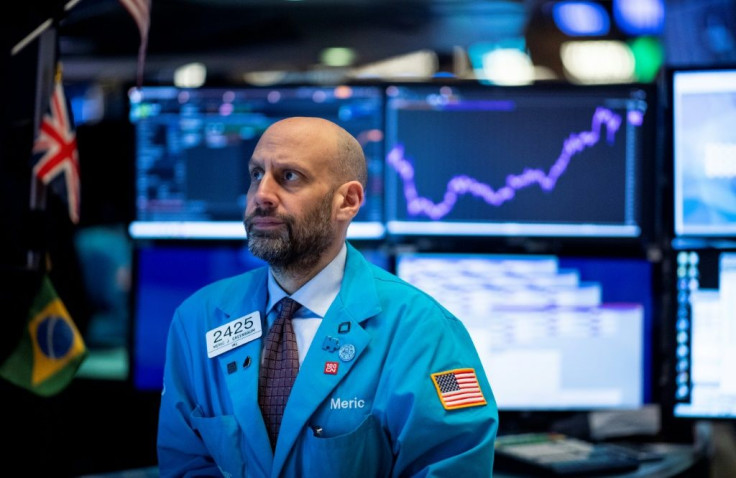Wednesday's Stock Market Close: US Equities Jump To Record Highs In Defiance Of Virus Fears

KEY POINTS
- All US equity benchmarks set new record high closes
- Oil futures continued to rebound
- The euro fell to its lowest level against the U.S. dollar in more than two and a half years.
U.S. stocks rose on Wednesday to all-time record closing highs as investors gauged how China is containing its coronavirus epidemic.
The Dow Jones Industrial Average gained 274.8 points to 29,550.80 while the S&P 500 rose 21.63 points to 3,379.38 and the Nasdaq Composite Index advanced 87.02 points to 9,725.96.
Volume on the New York Stock Exchange totaled 3.21 billion shares with 1,814 issues advancing, 267 setting new highs, and 1,130 declining, with 34 setting new lows.
Active movers were led by Ford Motor Co. (F), Bed Bath & Beyond (BBBY) and Teva Pharmaceutical Industries (TEVA).
Federal Reserve Chairman Jerome Powell testified before the Senate Banking Committee on Wednesday, citing the central bank will have an idea of the coronavirus’ impact on the U.S. economy “fairly soon.”
As of Tuesday night, China’s National Health Commission had reported confirmed cases of coronavirus had surpassed 44,000, with more than 1,100 deaths.
“There’s no reason why the current situation of low unemployment, rising wages, high job creation -- there’s no reason why it can’t go on,” Powell added in testimony. “There is nothing about this economy that is out of kilter or imbalanced.”
Philadelphia Federal Reserve President Patrick Harker said Wednesday that interest rates should remain unchanged as the U.S. economy grows.
“We should hold steady [on rates] for a while and watch how developments and the data unfold before taking any more action,” Harker said.
“The news in general continues to be good for the consumer sector. Thanks to the lowest unemployment rate in 50 years and growth in wages, consumers are upbeat about the economy. Consumer confidence is high, and the optimism should support household spending this year.”
On Wednesday the Organization of the Petroleum Exporting Countries reduced its forecast for global oil demand due to the coronavirus outbreak to 990,000 barrels per day this year, a cut of 230,000 bpd from its prior forecast.
The U.S. Treasury Department said Wednesday that the deficit from October 2019 through January 2020 was $389.2 billion, up $78.9 billion from the same period in the prior year. The Congressional Budget Office projected that the deficit will surpass $1 trillion this year.
“Investors showed resilience by pushing stocks back to all-time highs, especially in the U.S., anticipating a strong V-shaped recovery when this is over,” said Eylem Senyuz, global macro strategist at SunTrust Advisory. “[But] as the coronavirus continues to spread across China and the globe, much of its impact remains unknown.”
Nema Ramkhelawan-Bhana, an economist at Firstrand Bank in Johannesburg, commented: “an air of relief has permeated global markets following a sustained decline in the rate of new coronavirus cases, diminishing the risk premium. The absolute impact on economic growth is yet to be quantified, but markets appear more confident that its effects will be limited to the first quarter. The efforts of Chinese policy makers will prop up growth.”
Overnight in Asia, markets finished higher. China’s Shanghai Composite advanced 0.87%, while Hong Kong’s Hang Seng gained 0.87%, and Japan’s Nikkei-225 rose 0.74%.
In Europe markets closed higher, as Britain’s FTSE-100 rose 0.47%, France’s CAC-40 gained 0.83% and Germany’s DAX jumped 0.89%.
Crude oil futures surged 3.28% at $51.58 per barrel and Brent crude gained 0.59% at $56.12. Gold futures slipped 0.02%.
The euro fell 0.38% at $1.0876 while the pound sterling gained 0.05% at $1.2958. The euro fell to its lowest level against the U.S. dollar in more than two and a half years, likely due to fears over the economic impact of coronavirus.
The yield on the 10-year Treasury rose 2.52% to 1.63% while yield on the 30-year Treasury gained 1.95% to 2.091%.
© Copyright IBTimes 2024. All rights reserved.




















